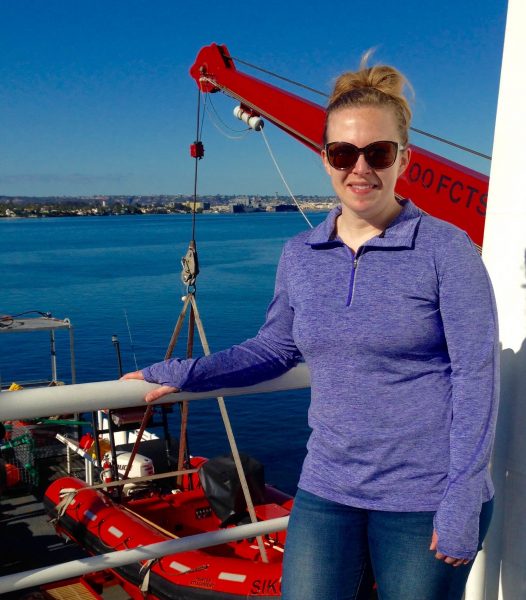Aspiring chief scientists train at sea
December 19, 2016
Meghan Murphy
9074747541

It’s not easy being a chief scientist at sea. That’s why 22 early career marine scientists signed up for the Chief Scientist Training Cruise program aboard the research vessel Sikuliaq as it traveled from Hawaii to California Dec. 2 to Dec. 17.
While on board, the scientists learned how to propose, plan and execute ocean-going research through the mentorship of two veterans — Bernard Coakley from the University of Alaska Fairbanks and Rob Pockalny from the University of Rhode Island. UAF's College of Fisheries and Ocean Sciences operates the Sikuliaq.
Participants in the training cruise mostly included graduate students, postdoctoral researchers and junior faculty from across the nation.
“They are learning how to make things happen,” said Coakley, a professor of marine geology at UAF’s Department of Geosciences and the Geophysical Institute.
Coakley said training programs like this didn’t exist when he was a graduate student in marine geology.
“You were expected to learn on the job as a cruise data collection drone,” he said. “Somehow, from that experience you were supposed to develop the skills to lead cruises.”
He said the training program aimed to eliminate some of the mystery of the process, enabling these scientists to develop and fund their best ideas. Participants explored the capabilities of the research vessel and how to make the most of their ship time and resources to answer scientific questions. They even learned to overcome seasickness.
They also got hands-on experience with the seafloor mapping sonars and other tools and working in shifts to map the seafloor 24 hours a day.
Coakley and Pockalny received grants from the National Science Foundation to plan and run the program. The cruise expanded on a planned transit of the ship from Honolulu to San Diego. NSF added six additional days to allow time for the students to execute seafloor surveys. These surveys were designed to address scientific questions that they identified through a process that included two days of lectures and discussions in Honolulu and daily lectures and critiques at sea.
Megan Roberts, a UAF environmental chemistry graduate student who hopes to study ocean contaminants, said she gleaned a lot from her time aboard the ship.
“I’m learning about what equipment and instrumentation you might need to bring with you, where to conduct research and how to plan way points,” she said. “ You also want to consider the schedule of the crew and be sensitive to their shift times for when you want to conduct sampling.”
She said knowing these logistics will serve her well on future research voyages, including the one she has planned for this spring.
Coakley said he hopes all participants on the training cruise left more confident in their abilities to raise funds to support their science and to be a chief scientist.
UAF participants in the program included Kristin Brown, Amanda Blackburn and Lauren Frisch from the College of Fisheries and Ocean Sciences and Megan Roberts from the College of Natural Science and Mathematics Department of Chemistry and Biochemistry.
ADDITIONAL CONTACT: Bernard Coakley, bjcoakley@alaska.edu, 907-474-5385.


